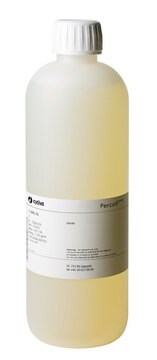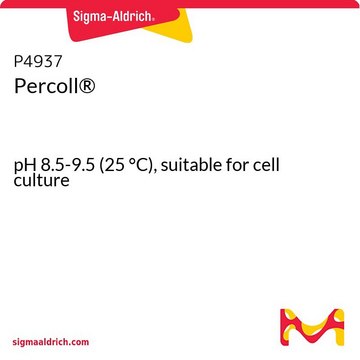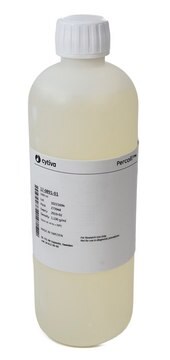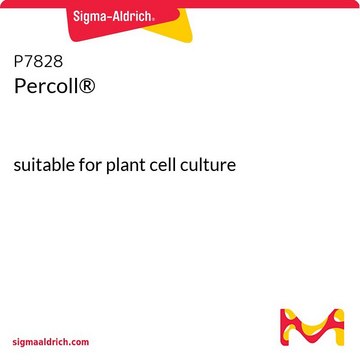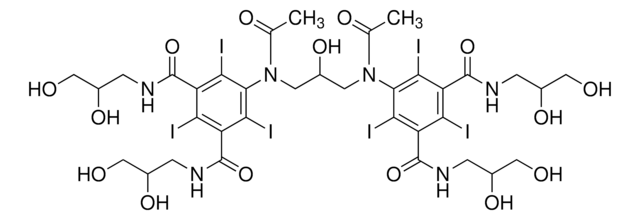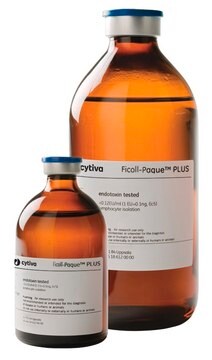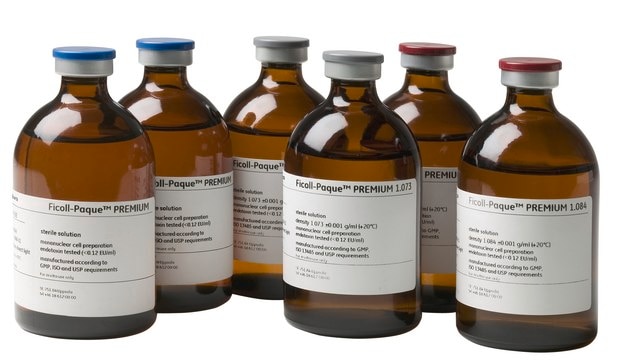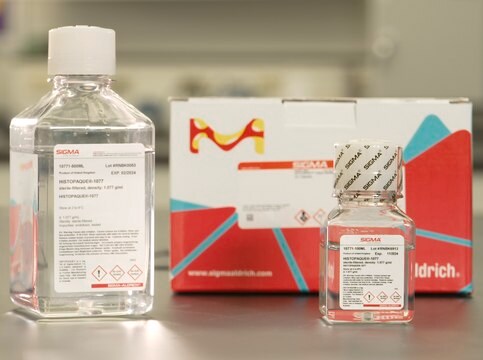GE17-0891-02
Percoll®
Cytiva 17-0891-02, pack of 250 mL
Synonim(y):
Percoll Density Gradient Media
About This Item
Polecane produkty
Formularz
colloidal (Colloidal solution of silica coated with polyvinylpyrrolidone (PVP))
liquid (Suspension)
solution
opakowanie
pack of 250 mL
producent / nazwa handlowa
Cytiva 17-0891-02
metody
cell culture | mammalian: suitable
kolor
Colorless to slightly yellow
zakres pH
8.5-9.5
temp. przechowywania
2-8°C
Powiązane kategorie
Opis ogólny
Percoll® is a low viscosity density gradient medium for preparation of cells, subcellular particles, and larger viruses. The low viscosity of the medium enables cell preparation on preformed gradients in only a few minutes using low centrifugal forces (200 to 1000 × g). The medium is available in easy-to-open, resealable 250 mL and 1 l bottles.
Percoll® consists of silica particles (15 to 30 nm diameter) coated with non-dialyzable polyvinylpyrrolidone (PVP). Free PVP is present at only 1% to 2%. Percoll® is non-toxic, almost chemically inert and does not adhere to membranes. Percoll® gradients can be formed within the density range of 1.0 to 1.3 g/mL, and are iso-osmotic throughout.
Percoll® can be stored unopened at room temperature for five years. At -20° C, it can only be stored for up to six months. If stored at -20° C, gradients form upon thawing, necessitating a mixing of the bottle before use. Preformed gradients can be stored for weeks without a change in gradient shape, provided that the gradient remains unfrozen. Percoll® can be buffered within the pH range 5.5 to 10.0 without any changes in properties. If the pH is dropped below 5.5, gelling may occur. Gelling can also be caused by the presence of divalent cations, an effect which is exacerbated by elevated temperatures.
Zastosowanie
Cechy i korzyści
- For separation of cells, subcellular particles and larger viruses (down to ~ 70S) under gentle conditions which preserve viability and morphological integrity.
- Non-toxic to cells.
- Adjustable to physiological ionic strength and pH.
- Gradients can either be preformed or spontaneously generated by centrifugation at moderate speeds in an angle-head rotor.
- Gradients are iso-osmotic throughout and cover a range of densities up to 1.3 g/mL.
Przechowywanie i stabilność
Komentarz do analizy
Informacje prawne
Kod klasy składowania
12 - Non Combustible Liquids
Klasa zagrożenia wodnego (WGK)
WGK 3
Temperatura zapłonu (°F)
Not applicable
Temperatura zapłonu (°C)
Not applicable
Wybierz jedną z najnowszych wersji:
Certyfikaty analizy (CoA)
It looks like we've run into a problem, but you can still download Certificates of Analysis from our Dokumenty section.
Proszę o kontakt, jeśli potrzebna jest pomoc Obsługa Klienta
Masz już ten produkt?
Dokumenty związane z niedawno zakupionymi produktami zostały zamieszczone w Bibliotece dokumentów.
Klienci oglądali również te produkty
Protokoły
Aby przygotować gradient Percolla, osmolalność Percolla musi być dostosowana za pomocą soli fizjologicznej lub pożywki do hodowli komórkowej, aby Percoll był izotoniczny z fizjologicznymi roztworami soli.
Nasz zespół naukowców ma doświadczenie we wszystkich obszarach badań, w tym w naukach przyrodniczych, materiałoznawstwie, syntezie chemicznej, chromatografii, analityce i wielu innych dziedzinach.
Skontaktuj się z zespołem ds. pomocy technicznej